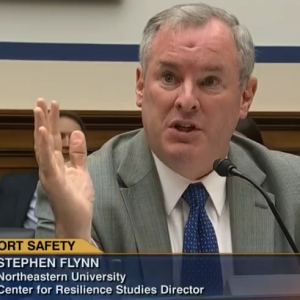House Hearing on the Threat of a Smuggled Dirty Bomb
Global Resilience Institute Director Stephen Flynn testified before the House of Representatives’ Coast Guard and Maritime Transportation Subcommittee on October 27th to discuss the threat of a dirty bomb at a U.S. port. The hearing also included testimony from representatives of the U.S. Coast Guard, U.S. Customs and Border Protection (CBP), DHS’s Domestic Nuclear Detection Office (DNDO), the Government Accountability Office (GAO), the American Association of Port Authorities, and two scientists. One of the main points of contention was Congress’s 2006 mandate that all U.S. bound cargo be scanned. This 100% mandate has been seen by many, such as Huban Gowadia of the DNDO, as not only very challenging to accomplish, but also “probably not” better than the current programs. Todd Owen of CBP added that, in “strategic locations” like Jordan and Pakistan, “it is the right approach.”

In his testimony, Flynn argued that the current efforts are not enough, illustrating a scenario in which “a longstanding vulnerability of the global supply system” is exploited: the ability to “target containerized cargo while it is being transported by a local truck.” Flynn also speculated that the terrorist group would target a known shipper, since there would be little chance of physical inspection. Additionally, the attack would generate maximum amount of fear” that the current system can no longer be trusted. This gets at one of Flynn’s major points: “if a dirty bomb were set off in a U.S. port, it would not be so much of a weapon of mass destruction as it would be one of mass disruption.” He outlined that, in all likelihood, a successful attack would mean the shutdown of the global supply system, severely damaging the global economy on which the United States relies so much.
Flynn delineated two steps for the U.S. government in his testimony: a “shift [in] emphasis” to “advancing the overall security of the global supply system” and an effort to “enlist the active participation of the private industry that owns and operates the port terminals.” As a “business continuity…imperative,” he continued, there is a significant incentive for these actors to play an active role. He suggested that the U.S. government work with industry operators to “bake [security measures] into the operation.”
Sources:
Prevention of and Response to the Arrival of a Dirty Bomb at a U.S. Port – Coast Guard and Maritime Transportation Subcommittee
Lawmakers fret about potential terrorist attacks at US ports – The Hill
US legislators highlight dirty bomb threat in appeal for 100% container scanning – Journal of Commerce
Further Reading:
House Panel Addresses Dirty Bomb Prevention at U.S. Ports – SEAPOWER Magazine
House panel hearing looking into threat of dirty bombs entering U.S. ports – TI News Daily
House Committee on Transportation and Infrastructure to hold dirty bomb prevention hearing – BioPrepWatch
